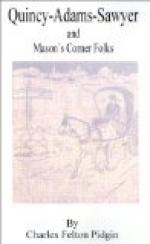The Professor attentively regarded the pattern of the carpet on the floor.
Quincy continued, “Miss Lindy Putnam has repeated to me what she told Mr. Stiles about her visit to Boston, and attributed the distorted and untrue form in which it reached the inhabitants of this town to your well-known powers of invention. Am I right?”
The Professor looked up. “I’ll have somethin’ to say when you git through,” he replied.
“I expect and ask no apology or reparation for what you’ve said about me,” remarked Quincy. “You made your boast that one of us had got to leave town, and it wouldn’t be you. When I heard that I determined to stay at whatever cost, and we’ll settle this afternoon which one of us is going to change his residence.”
“I don’t think you kin run me out o’ town,” said Strout, savagely.
“Well, I don’t know,” rejoined Quincy. “Let us see what I have done in a week. You insulted Mr. Pettengill and his sister by not inviting them to the surprise party. I know it was done to insult me rather than them, but you will remember that we three were present, and had a very pleasant time. I was the lawyer that advised Deacon Mason not to loan that five hundred dollars to pay down on the store. I told the Deacon I would loan him five hundred dollars if the store was knocked down to you, but I would have had that store if it had cost me ten thousand dollars instead of three. I was the one who put your war record in the hands of Mr. Tobias Smith, and I was the one that prepared the statement which showed how negligent you had been in attending to your duties as tax collector.”
“Payin’ so much attention to other people’s business must have made yer forget yer own,” said Strout, shutting his teeth together with a snap.
“Oh, no,” remarked Quincy, with a laugh; “I had plenty of time left to take a hand in village politics, and my friend Mr. Stackpole was elected by a very handsome vote, as you have no doubt heard.” Strout dug his heel into the carpet, but said nothing.
“Now,” continued Quincy, “I’ve had your appointment as postmaster held up till you and I come to terms.”
“You’re takin’ a lot of trouble for nothin’,” said Strout. “I can’t be postmaster unless I have a store. I guess I kin manage to live with my music teachin’ and organ playin’ at the church.”
“I’ve thought of that,” said Quincy. “I don’t wish to go to extremes, but I will if it is necessary. Before you leave this room, Mr. Strout, you must decide whether you will work with me or against me in the future.”
“S’posin’ I decide to work agin yer?” asked Strout; “what then?”
“Well,” said Quincy sternly, “if you drive me to it, I’ll bring down a couple of good music teachers from Boston. They’ll teach music for nothing, and I’ll pay them good salaries. The church needs a new organ, and I’ll make them a present of one, on condition that they get a new organist.”




